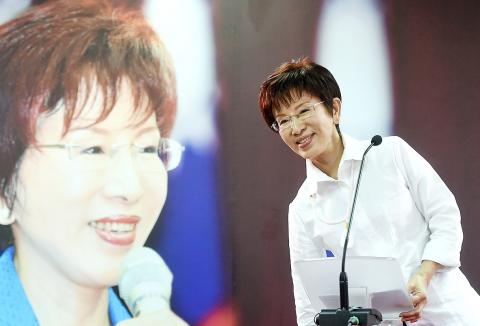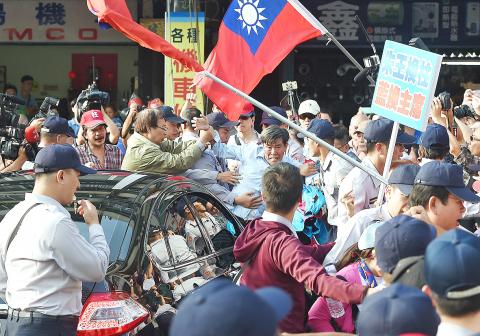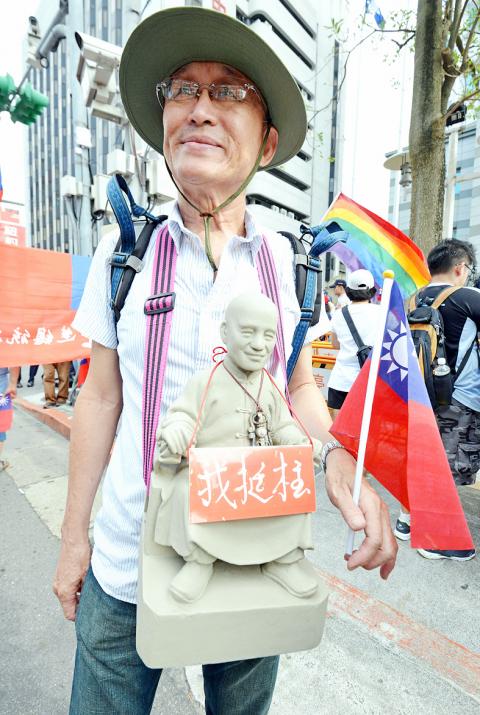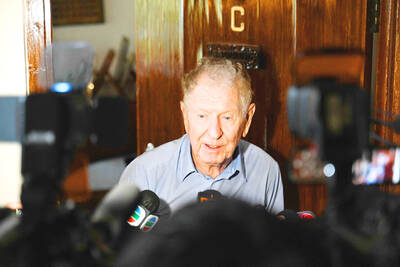While the call to replace Hung Hsiu-chu (洪秀柱) as the Chinese Nationalist Party (KMT) presidential candidate was voiced loudly at the party’s Central Standing Committee meeting yesterday, angry Hung supporters gathered outside KMT headquarters in Taipei to protest a plan to replace Hung, demanding that KMT Chairman Eric Chu (朱立倫) resign.
More than a hundred supporters, many clad in red and blue, rallied yesterday afternoon outside the building, behind a line of police officers and blockades set up in front.
At least five groups, including the White Justice Alliance, had rallied Hung’s supporters on Facebook before yesterday’s protest as the party’s Central Standing Committee mulled calling an extempore party congress to pass a resolution to replace the deputy legislative speaker as the KMT’s presidential candidate.

Photo: Chien Jung-fong, Taipei Times
The crowd raised various banners rooting for Hung, castigating Chu and calling on the KMT to stay true to its principles.
“Our opponent is [Democratic Progressive Party (DPP) presidential candidate] Tsai [Ing-wen (蔡英文)]” and “The 100-year-old party is depending on Hung for change” were among the slogans.
The supporters were predominantly elderly, with just a few young people spotted among the crowd.

Photo: Liao Chen-huei, Taipei Times
China Unification Promotion Party Chairman Chang An-le (張安樂), also known as the “White Wolf,” appeared for a short period of time, shouting his opposition to the KMT’s plan to remove Hung from the race.
“What is wrong with calling for an ultimate unification [between Taiwan and China]?” Chang asked. “If you are called the Chinese Nationalist Party, you should not object to unification.”
“The KMT has ended up in this mess because it does not dare admit that it is Chinese,” he said, asking why none of the KMT heavyweights had borne the responsibility of running for president in May and had to let “Hung, a little girl” do so.

Photo: Sam Yeh. AFP
There were also some unexpected protesters in the crowd.
A group of former freeway toll collectors, accompanied by labor activists, were there to accuse both the KMT and the DPP of failing to propose a solution for workers laid off when the nation switched to an electronic toll collection system in January last year.
They were criticized by Hung’s supporters, who questioned “their intentions and why they were not busy looking for jobs.”
“The workers’ stance is that whoever takes care of the workers will get our vote,” the former toll collectors said.
Gay rights activist Chi Chia-wei (祁家威), holding a rainbow-colored flag and claiming to represent pan-blue gays, said he had joined the protest because he believes Hung would be supportive of the marriage equality campaign.
“I know that quite a few members of her campaign team are gay, meaning that Hung is actually supporting us in a substantive way,” Chi said.
When asked about the fact that Hung had not openly voiced her support for same-sex marriage, Chi said that what he cares about is the concrete assistance that politicians provide, citing former KMT Taipei City councilor — and current KMT spokesperson — Lin Yi-hua (林奕華), who Chi said had helped the gay community many times during her term as a councilor.
He said he did not think Tsai would push for same-sex marriage “because, unlike Hung, she has been accused of being gay, and like [President] Ma [Ying-jeou (馬英九)], she would not proactively push the passage of a bill for fear of being labeled.”

US PUBLICATION: The results indicated a change in attitude after a 2023 survey showed 55 percent supported full-scale war to achieve unification, the report said More than half of Chinese were against the use of force to unify with Taiwan under any circumstances, a survey conducted by the Atlanta, Georgia-based Carter Center and Emory University found. The survey results, which were released on Wednesday in a report titled “Sovereignty, Security, & US-China Relations: Chinese Public Opinion,” showed that 55.1 percent of respondents agreed or somewhat agreed that “the Taiwan problem should not be resolved using force under any circumstances,” while 24.5 percent “strongly” or “somewhat” disagreed with the statement. The results indicated a change in attitude after a survey published in “Assessing Public Support for (Non)Peaceful Unification

The CIA has a message for Chinese government officials worried about their place in Chinese President Xi Jinping’s (習近平) government: Come work with us. The agency released two Mandarin-language videos on social media on Thursday inviting disgruntled officials to contact the CIA. The recruitment videos posted on YouTube and X racked up more than 5 million views combined in their first day. The outreach comes as CIA Director John Ratcliffe has vowed to boost the agency’s use of intelligence from human sources and its focus on China, which has recently targeted US officials with its own espionage operations. The videos are “aimed at

‘MISGUIDED EDICT’: Two US representatives warned that Somalia’s passport move could result in severe retaliatory consequences and urged it to reverse its decision Minister of Foreign Affairs Lin Chia-lung (林佳龍) has ordered that a special project be launched to counter China’s “legal warfare” distorting UN Resolution 2758, a foreign affairs official said yesterday. Somalia’s Civil Aviation Authority on Wednesday cited UN Resolution 2758 and Mogadishu’s compliance with the “one China” principle as it banned people from entering or transiting in the African nation using Taiwanese passports or other Taiwanese travel documents. The International Air Transport Association’s system shows that Taiwanese passport holders cannot enter Somalia or transit there. The Ministry of Foreign Affairs (MOFA) protested the move and warned Taiwanese against traveling to Somalia or Somaliland

Four former Hong Kong opposition lawmakers jailed in the territory’s largest national security case were released yesterday after more than four years in prison, the first among dozens convicted last year to regain their freedom. Former legislators Claudia Mo (毛孟靜), Jeremy Tam (譚文豪), Kwok Ka-ki (郭家麒) and Gary Fan (范國威) were part of a group of 47 public figures — including some of Hong Kong’s best-known democracy advocates — who were charged with subversion in 2021 for holding an informal primary election. The case fell under a National Security Law imposed on the territory by Beijng, and drew international condemnation and warnings